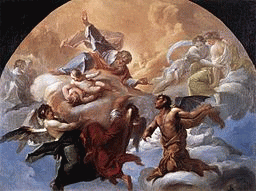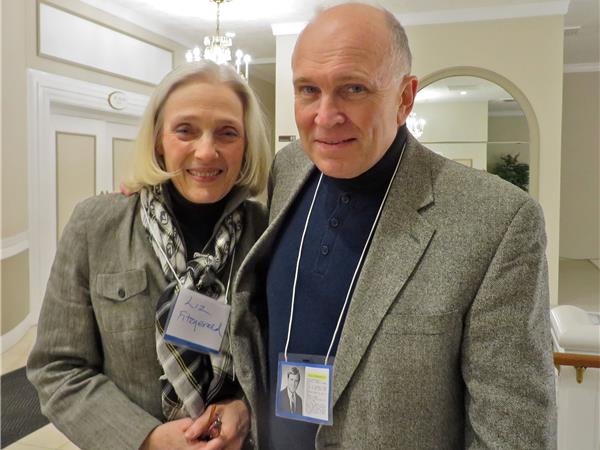The Sordid History of British Manipulation of American Democracy Series: Read it and weep!

Satan before the Lord
(Image by |Source=http://wga.hu/index1.html, Author: Author Not Given) Details Source DMCA
"This decidedly mixed record [of successful and failed African coups] did not prevent the return of some of the mercenaries to the world scene, this time to Afghanistan. By the early 1970s London had become a center of the arms trade as well as of the recruiting of already trained 'soldiers of fortune' to serve both as trainers and in operational roles" There was a covert group of such personnel, available for hire, and known in London as 'the Circuit' or sometimes simply as "the lads."
John K. Cooley, Unholy Wars, 1999
Even at this late date few Americans understand how the U.S. government came to be owned by the London-backed neoconservative/right-wing alliance that grew out of the post-Vietnam era and how its obsessive compulsion to forge "the one ring to rule them all" has driven the U.S. and its NATO cohorts into an apocalyptic hysteria. Neither do they understand that it was the presidency of James Earl Carter and not Ronald Reagan that opened the door to the rise of Islamic extremism, the sellout of the middle class and the disenfranchisement of America's constitutional values.
Whether he admired Jimmy Carter or not, Brian Crozier and Zbigniew Brzezinski were of one mind when it came to disbelieving in "mutual coexistence" or power-sharing with the Soviet Union and Brzezinski's membership in the Washington Institute for the Study of Conflict, WISC proved it. The deep bureaucratic influence of Crozier's new institute could be measured in its choice of board members all of whom had been actively preparing the ground for an ideological rollover for decades. Thanks to WISC member Richard Pipes and the Team B, Brzezinski could now bring Britain's radical right-wing formula for social change right into the Oval Office and the new President from Georgia was ready and willing to sign on.
Working closely after the election with Carter and one of Henry Kissinger's former National Security staffers, David Aaron, on the Island retreat of St. Simon, Brzezinski devised a simple structure that channeled all executive decisions into two committees, the Policy Review Committee (PRC) and the Special Coordination Committee (SCC). The PRC's function was to deal with foreign policy, defense policy and international economic issues and would be chaired by a variety of cabinet secretaries. The SCC's responsibilities were covert intelligence and other sensitive operations, arms control and crisis management and would be chaired exclusively by Brzezinski. Carter then took it one step further by elevating the national security advisor to cabinet level and the palace coup was complete before Gerald Ford left the White House. In a fundamental break with the past, Brzezinski's SCC would now be at the center of American foreign policy and not the State Department.
As recalled with relish by the Neoconservative author and professor of international relations David J. Rothkopf in Charles Gati's 2013 book ZBIG, "It was a bureaucratic first strike of the first order. The system essentially gave responsibility for the most important and sensitive issues to Brzezinski, and the vague definition of what constituted crisis management essentially ensured that if anything came up that was important it could be claimed by the White House."
The new structure effectively froze the incoming Secretary of State, Cyrus Vance out of the decision-making process before Carter had even entered the Oval Office. More importantly, it also delivered to Brzezinski control over covert action and a free hand to use it wherever he saw fit. Former CIA Director Robert Gates recalled how President Carter pushed for covert action over diplomacy from the very beginning of his administration in his 1997 book From the Shadows. "Indeed, as Carter turned to covert action within weeks after his inauguration and increasingly frequently thereafter, the most constant criticism of CIA that I heard from both Brzezinski and Aaron was its lack of enthusiasm for covert action and its lack of imagination and boldness in implementing the President's 'findings' (legal shorthand for covert actions)."
One bold, imaginative operation initiated by Brzezinski in 1977 was the Nationalities Working Group (NWG), dedicated to weakening the Soviet Union by inflaming ethnic tensions among the Islamic populations of the South Asia region. Already in Kabul to help implement the plan was Graham Fuller whose expertise as CIA operative was on politicizing Islamic radicals on behalf of American interests. As the CIA's Kabul station chief from 1975 to 1978 Fuller was perfectly placed to provide the intelligence and the contacts necessary to coordinate Brzezinski's covert pressure from Iran, Saudi Arabia, Pakistan and China with the CIA's next big adventure; Afghanistan.
Brzezinski's rewiring didn't stop at covert action but continued on into nuclear policy toward the Soviet Union beginning immediately after assuming control. On February 3, 1977 Carter attended the first session of Brzezinski's SCC on the long delayed Strategic Arms Limitation Talks (SALT) at which a competing initiative to the State Department's was put into action. Limiting the growth of nuclear weapons and delivery systems available to the Pentagon under de'tente had been an ongoing process with the Soviets under two previous presidents with agreed to protocols and expectations. Now Carter suddenly shifted the SALT structure from limitation to deep cuts forcing an unprepared Vance to fly off to meet the unprepared Soviets with a proposal that was guaranteed to fail.
Brzezinski's aggressive approach was no surprise to some on his staff who believed the offer was intended as a trick to "show up the Soviets for what they were." But the evidence of Brzezinski's rigging the deck against Vance was even clearer. David J. Rothkopf writes, "Brzezinski shepherded the process closely and even went so far as having William Hyland, working for the NSC, oversee the delivery of the negotiating instructions to ensure that they did not get into the hands of the State Department until the instant of their departure."
With Vance's hands tied by the President, a Russophobic Brzezinski expanding nuclear targeting options from 25,000 to 40,000 and covert action teams sabotaging behind Soviet lines from early 1977 onward, it doesn't take much to imagine what the Soviets were thinking. Brzezinski and Carter were letting the Soviets know they were ripping up SALT and De'tente as well as the very assumptions both were based on. Rothkopf quotes Carter Defense Secretary Harold Brown. "Brzezinski had, I think, a more apocalyptic view of the world and especially a different attitude toward the Soviets" he believed that concessions to the Russians merely encouraged them to press further, and he was willing to use almost any device or any other relationship with other countries to contain them."
Brown goes on to say Brzezinski believed that the United States "should use China as a weapon against the Soviets". But it was in Afghanistan, in the run up to the Afghan crisis where the results of Brzezinski's weaponizing can best be seen not to mention the faint traces of off-the-books secret agencies helping him do it. Selig Harrison , former Washington Post foreign correspondent and Senior Associate at the Carnegie Endowment for International Peace commented on Brzezinski's role in fomenting the crisis in Afghanistan in his book, co-authored with Diego Cordovez Out of Afghanistan: "Brzezinski had steadily eroded Vance's power, persuading the President to transfer jurisdiction over the CIA from the Inter-Agency Policy Review Committee, headed by the Secretary of State, to the National Security Council's Special Coordinating Committee [SCC] which Brzezinski chaired as the National Security Advisor. This control over covert operations enabled Brzezinski to take the first steps toward a more aggressively anti-Soviet Afghan policy without the State Department's knowing much about it."
Brzezinski's plot to weaponize China against Russia by sacrificing Afghanistan was straight out of James Burnham's Machiavellians and the spontaneous April, 1978 Marxist coup against the King's cousin, Mohammed Daoud played like clockwork directly into his "predictions" of Soviet infiltration and subversion. Harrison writes, "Vance recalls that the April coup was depicted by Brzezinski as the opening gambit in a Soviet master plan for achieving hegemony in Southwest Asia. It would be followed in due course, Brzezinski argued, by the incorporation of Afghanistan into the Soviet orbit and ultimately by political and military moves to subjugate the Gulf oil-producing states."
Vance rejected Brzezinski's argument out of hand. As supported at the time by the State Department's own intelligence and later revealed by post-Soviet research, the coup appeared to be a spur of the moment outburst by disorganized, repressed political factions unsure of exactly what they were doing. Vance found no evidence of Soviet complicity in the coup and even Brian Crozier would later have to admit in his autobiography that none would ever materialize. In fact, the evidence suggests that the 1978 Marxist coup in Afghanistan was the end result of CIA, Pakistani and Iranian efforts to undermine Daoud's regime, and was only supported by the Soviets after it had become a fait accompli. Brzezinski's prediction was ideological wish-fulfillment, more in line with discredited right-wing ISC reports or something conjured by the mind of Team B than with any sober professional analysis of Soviet intentions. And, had it been the first shot in a Soviet master plan to seize Southwest Asia and the Middle East, the April coup plotters Nur Mohammed Taraki and Hafizullah Amin would never have been Moscow's choice to lead it. According to David Newsom, Undersecretary of State for Political Affairs who visited Kabul after the coup and met with the coup leaders, "My assessment was that we were dealing with a regime that hadn't found itself. There were divisions in it and it was still on probation in Soviet eyes."
Terror in Soviet eyes was more like it. The coup plotters were divided into two main factions that fought bitterly and the coup organizer, Hafizullah Amin had been brought to the United States by a CIA front organization on two separate occasions to be educated. According to the KGB chief Alexander Morozov, the KGB later discovered Amin's instructions to the plotters severely forbade them from informing the Russians of the plan lest they try to stop it. Amin had even admitted to the KGB that he'd taken money from the CIA. He had studied for a doctorate at Columbia University and headed up the Afghan Student Association at a time when (as exposed by Ramparts Magazine) it too was being used as a CIA recruitment tool for future Third World leaders. Hafizullah Amin was now one of those leaders and Vance was sending a new, tough and savvy American Ambassador to Kabul named Adolph "Spike" Dubs to deal with him.
(Note: You can view every article as one long page if you sign up as an Advocate Member, or higher).





